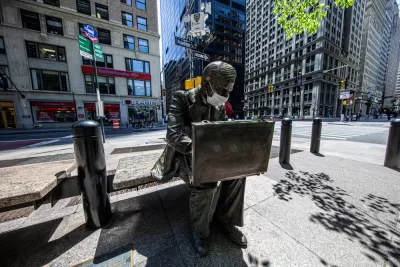The back-to-work data everyone is talking about? It comes from a security company that offers swipe badges for entrance into office buildings all over the country. Some experts say their data is too incomplete to be authoritative, however.

The data driving the public understanding of office vacancies in the wake of the Covid-19 pandemic has come into new scrutiny in recent weeks, first with a story in Bloomberg, and then a more skeptical article in the New York Post.
The company at the center of attention is Kastle Systems Inc., which provides security badges for building entry in 2,600 buildings in 138 cities, according to the article by Sarah Holder for Bloomberg.
Office occupancy has become intoxicating, according to Holder, and Kastle is at the forefront of the data reporting the trends in the post-pandemic workplace, publishing a weekly “Back-to-Work Barometer.”
“Fast-forward to 2022, and the 50-year old company has become, if not exactly a household name, at least the most well-known player in a not-so-sexy industry—and a key participant in the ongoing conversation about when, and whether, remote workers will get back to their desks,” writes Holder.
A few days after the Bloomberg article, however, Steve Cuozzo wrote an article for the New York Post offering another side to the story—i.e., that the "Back-to-Work Barometer” is far from complete.
“The widely cited Kastle Systems Back-to-Work Barometer, which claims to tally how many employees have returned to offices, misses hundreds of skyscrapers with the highest attendance — and the result is a whopping undercount, real estate insiders say,” writes Cuozo.
The controversy is reminiscent of the numerous occasions that housing experts have instructed media outlets not to rely on listing websites—which don't have access to significant swaths of the housing market, especially at the low end—to draw conclusions about the housing market.
Similarly, the Post analysis presented by Cuozzo finds that Kastle data misses too many large buildings in New York City to draw a complete picture of office vacancy.
FULL STORY: Meet Kastle Systems, the Covid-Era Kings of Back-to-Work Data

Trump Administration Could Effectively End Housing Voucher Program
Federal officials are eyeing major cuts to the Section 8 program that helps millions of low-income households pay rent.

Planetizen Federal Action Tracker
A weekly monitor of how Trump’s orders and actions are impacting planners and planning in America.

Ken Jennings Launches Transit Web Series
The Jeopardy champ wants you to ride public transit.

California Invests Additional $5M in Electric School Buses
The state wants to electrify all of its school bus fleets by 2035.

Austin Launches $2M Homelessness Prevention Fund
A new grant program from the city’s Homeless Strategy Office will fund rental assistance and supportive services.

Alabama School Forestry Initiative Brings Trees to Schoolyards
Trees can improve physical and mental health for students and commnity members.
Urban Design for Planners 1: Software Tools
This six-course series explores essential urban design concepts using open source software and equips planners with the tools they need to participate fully in the urban design process.
Planning for Universal Design
Learn the tools for implementing Universal Design in planning regulations.
Ada County Highway District
Clanton & Associates, Inc.
Jessamine County Fiscal Court
Institute for Housing and Urban Development Studies (IHS)
City of Grandview
Harvard GSD Executive Education
Toledo-Lucas County Plan Commissions
Salt Lake City
NYU Wagner Graduate School of Public Service





























